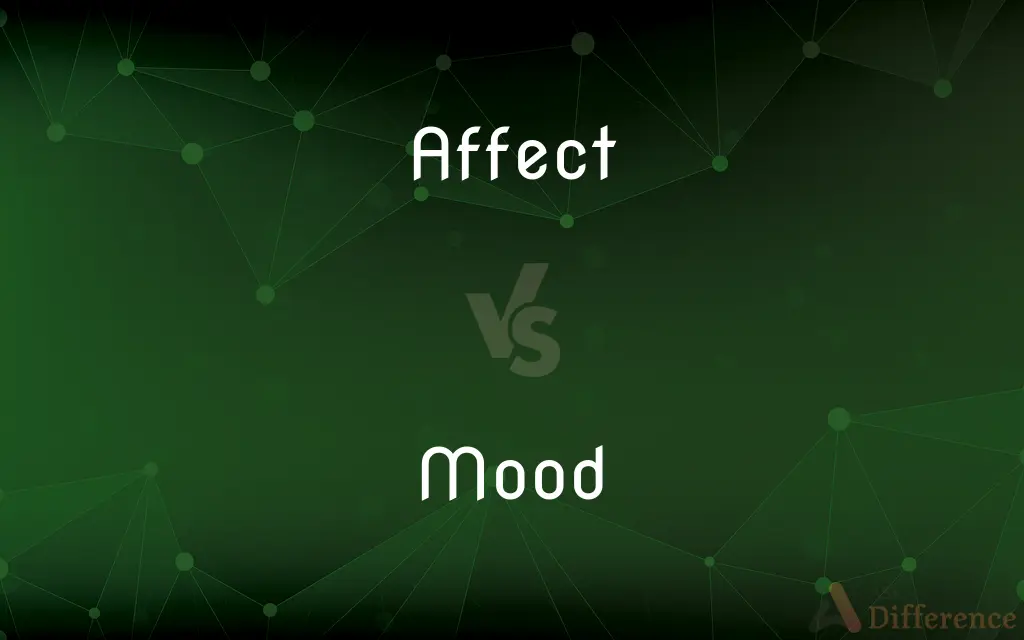Affect vs. Mood — What's the Difference?
Edited by Tayyaba Rehman — By Fiza Rafique — Updated on November 1, 2023
Affect is an immediate emotional response; mood is a sustained emotional state.

Difference Between Affect and Mood
Table of Contents
ADVERTISEMENT
Key Differences
Affect is the external display of one's internal emotions, which can be observed through facial expressions, tone of voice, and body language. Affect is often changing rapidly and can be seen in the immediate emotional reactions to stimuli. Mood, in contrast, is a more enduring emotional state that colors one's perspective over a period of time.
While affect can be described as fleeting and variable, mood denotes a pervasive and sustained emotional "climate." Affect can be assessed at a specific moment and might not necessarily define one's general emotional state, unlike mood, which is more stable and can last for days, weeks, or even longer.
The term affect might be used to describe the immediacy of feelings that arises in a specific situation, such as a flash of anger when cut off in traffic. Mood, however, would refer to the underlying feeling tone, like feeling irritable or down for several hours or days without a specific inciting incident.
In psychological assessment, affect is observed during the interaction with the individual and is often a focus of diagnostic criteria. Mood, on the other hand, is often reported by the individual and is a subject of inquiry when diagnosing mood disorders.
Therapists might inquire about a person's affect to understand their immediate emotional reactions, which could be flat, appropriate, or exaggerated. Mood is queried to grasp the overall emotional backdrop, which could be described using terms such as depressed, anxious, euphoric, or neutral.
ADVERTISEMENT
Comparison Chart
Duration
Short-term, transient.
Long-term, sustained.
Observation
Externally observable reactions.
Internally sustained state, not always observable.
Fluctuation
Can change rapidly with different stimuli.
Tends to be stable over a period of time.
Description
Immediate and observable emotion.
Pervasive emotional state.
Psychological Usage
Used in assessing emotional response in the moment.
Used in diagnosing longer-term emotional disorders.
Compare with Definitions
Affect
Affect refers to the observable manifestation of emotions.
His affect was flat, showing no reaction to the news.
Mood
Mood is a sustained emotional tone that can last for days.
A mood of solemnity prevailed after the solemn ceremony.
Affect
Affect encompasses the range of feelings expressed by individuals.
The patient's affect was highly animated when discussing her passion.
Mood
Mood is a persistent emotional state.
His cheerful mood brightened the entire room.
Affect
Affect is the experience of feeling or emotion.
She showed a joyful affect after receiving the birthday surprise.
Mood
Mood affects one’s overall temperament and outlook.
Her gloomy mood was evident in her reluctance to join the celebration.
Affect
Affect can be congruent or incongruent with the spoken word.
Despite his words of apology, his affect was aggressive.
Mood
Mood can influence perception and social interaction.
His irritable mood made the interview process challenging for the applicants.
Affect
Affect is the outward expression of emotions in psychology.
The child’s affect was blunted, rarely showing excitement or sadness.
Mood
A particular state of mind or emotion
News that put us in a good mood.
Affect
To have an influence on or effect a change in
Inflation affects the buying power of the dollar.
Mood
A pervading impression of an observer
The somber mood of the painting.
Affect
To act on the emotions of; touch or move.
Mood
An instance or spell of sulking or angry behavior
A friend's visit lifted him out of his mood.
Affect
To attack or infect, as a disease
Rheumatic fever can affect the heart.
Mood
Inclination; disposition
I'm in the mood for ice cream.
Affect
To put on a false show of; simulate
Affected a British accent.
Mood
A property of verbs in which the speaker's attitude toward the factuality or likelihood of the action or condition expressed.
Affect
To have or show a liking for
Affects dramatic clothes.
Mood
A category or set of verb forms or inflections used to indicate such an attitude. In English, the indicative mood is used to make factual statements, the subjunctive mood to indicate doubt or unlikelihood, and the imperative mood to express a command.
Affect
(Archaic) To fancy; love.
Mood
(Logic) The arrangement of statement types in a syllogism.
Affect
To tend to by nature; tend to assume
A substance that affects crystalline form.
Mood
A mental or emotional state, composure.
I've been in a bad mood since I was dumped by my ex-boyfriend.
Affect
To imitate; copy
"Spenser, in affecting the ancients, writ no language" (Ben Jonson).
Mood
Emotional character (of a work of music, literature, or other art).
Affect
Feeling or emotion, especially as manifested by facial expression or body language
"The soldiers seen on television had been carefully chosen for blandness of affect" (Norman Mailer).
Mood
A sullen, gloomy or angry mental state; a bad mood.
He's in a mood with me today.
Affect
(Obsolete) A disposition, feeling, or tendency.
Mood
A disposition to do something, a state of mind receptive or disposed to do something.
I'm not in the mood for running today.
Affect
(transitive) To influence or alter.
The experience affected me deeply.
The heat of the sunlight affected the speed of the chemical reaction.
Mood
A prevalent atmosphere, attitude, or feeling.
A good politician senses the mood of the crowd.
Affect
(transitive) To move to emotion.
He was deeply affected by the tragic ending of the play.
Mood
(slang) A familiar, relatable feeling, experience, or thing.
Affect
Of an illness or condition, to infect or harm (a part of the body).
Hepatitis affects the liver.
Mood
(grammar) A verb form that depends on how its containing clause relates to the speaker’s or writer’s wish, intent, or assertion about reality.
The mood most frequently encountered in English is the indicative, of which the mood in this sentence is an example.
Affect
To dispose or incline.
Mood
(slang) Used to express that the speaker finds something very relatable.
—I am feeling very exhausted today. —Mood.
Affect
To tend to by affinity or disposition.
Mood
Manner; style; mode; logical form; musical style; manner of action or being. See Mode which is the preferable form).
Affect
To assign; to appoint.
Mood
Manner of conceiving and expressing action or being, as positive, possible, conditional, hypothetical, obligatory, imperitive, etc., without regard to other accidents, such as time, person, number, etc.; as, the indicative mood; the imperitive mood; the infinitive mood; the subjunctive mood. Same as Mode.
Affect
To burden (property) with a fixed charge or payment, or other condition or restriction.
Mood
Temper of mind; temporary state of the mind in regard to passion or feeling; humor; as, a melancholy mood; a suppliant mood.
Till at the last aslaked was his mood.
Fortune is merry,And in this mood will give us anything.
The desperate recklessness of her mood.
Affect
(transitive) To make a show of; to put on a pretense of; to feign; to assume. To make a false display of.
To affect ignorance
To affect a British accent
He managed to affect a smile despite feeling quite miserable.
Mood
A characteristic (habitual or relatively temporary) state of feeling;
Whether he praised or cursed me depended on his temper at the time
He was in a bad humor
Affect
To aim for, to try to obtain.
Mood
The prevailing psychological state;
The climate of opinion
The national mood had changed radically since the last election
Affect
To feel affection for (someone); to like, be fond of.
Mood
Verb inflections that express how the action or state is conceived by the speaker
Affect
To show a fondness for (something); to choose.
Mood
Mood is a longer-lasting emotional condition compared to affect.
Despite the varying news throughout the day, her mood remained optimistic.
Affect
(psychology) A subjective feeling experienced in response to a thought or other stimulus; mood, emotion, especially as demonstrated in external physical signs.
Affect
(obsolete) One's mood or inclination; mental state.
Affect
(obsolete) A desire, an appetite.
Affect
To act upon; to produce an effect or change upon.
As might affect the earth with cold heat.
The climate affected their health and spirits.
Affect
To influence or move, as the feelings or passions; to touch.
A consideration of the rationale of our passions seems to me very necessary for all who would affect them upon solid and pure principles.
Affect
To love; to regard with affection.
As for Queen Katharine, he rather respected than affected, rather honored than loved, her.
Affect
To show a fondness for; to like to use or practice; to choose; hence, to frequent habitually.
For he does neither affect company, nor is he fit for it, indeed.
Do not affect the society of your inferiors in rank, nor court that of the great.
Affect
To dispose or incline.
Men whom they thought best affected to religion and their country's liberty.
Affect
To aim at; to aspire; to covet.
This proud man affects imperial way.
Affect
To tend to by affinity or disposition.
The drops of every fluid affect a round figure.
Affect
To make a show of; to put on a pretense of; to feign; to assume; as, to affect ignorance.
Careless she is with artful care,Affecting to seem unaffected.
Thou dost affect my manners.
Affect
To assign; to appoint.
One of the domestics was affected to his special service.
Affect
Affection; inclination; passion; feeling; disposition.
Affect
The emotional complex associated with an idea or mental state. In hysteria, the affect is sometimes entirely dissociated, sometimes transferred to another than the original idea.
Affect
The conscious subjective aspect of feeling or emotion
Affect
Have an effect upon;
Will the new rules affect me?
Affect
Act physically on; have an effect upon
Affect
Connect closely and often incriminatingly;
This new ruling affects your business
Affect
Make believe with the intent to deceive;
He feigned that he was ill
He shammed a headache
Affect
Have an emotional or cognitive impact upon;
This child impressed me as unusually mature
This behavior struck me as odd
Common Curiosities
How do affect and mood differ?
Affect is a short-term emotional reaction, whereas mood is more enduring.
Is affect always visible?
Affect is typically visible, but it can sometimes be subtle.
What is affect?
Affect is an observable expression of emotions.
Does mood affect behavior?
Yes, mood can significantly influence behavior and perception.
Can affect and mood be incongruent?
Yes, someone can display a happy affect while still in a depressed mood.
What influences mood?
Mood can be influenced by a variety of factors, including environment, health, and thoughts.
How is mood assessed?
Mood is often assessed through self-report measures and clinical observation over time.
What is mood?
Mood is a longer-lasting emotional state.
How long does mood last?
Mood can last anywhere from hours to weeks, or even longer.
Can medications affect a person’s mood?
Yes, many medications can have an impact on a person's mood.
Can a person's mood affect their affect?
Yes, someone’s mood can influence the type of affect they display.
What can cause a person's affect to change?
Affect can change due to immediate emotional responses to stimuli.
Are affect and mood related to mental health?
Both affect and mood are key components in the assessment of mental health.
Can mood be hidden?
Yes, people can hide their mood or not be fully aware of it.
Why is understanding affect and mood important in psychology?
Understanding both is vital for accurate diagnosis and effective treatment of psychological conditions.
Share Your Discovery

Previous Comparison
Chlorophyll vs. Haemoglobin
Next Comparison
Indigenization vs. LocalizationAuthor Spotlight
Written by
Fiza RafiqueFiza Rafique is a skilled content writer at AskDifference.com, where she meticulously refines and enhances written pieces. Drawing from her vast editorial expertise, Fiza ensures clarity, accuracy, and precision in every article. Passionate about language, she continually seeks to elevate the quality of content for readers worldwide.
Edited by
Tayyaba RehmanTayyaba Rehman is a distinguished writer, currently serving as a primary contributor to askdifference.com. As a researcher in semantics and etymology, Tayyaba's passion for the complexity of languages and their distinctions has found a perfect home on the platform. Tayyaba delves into the intricacies of language, distinguishing between commonly confused words and phrases, thereby providing clarity for readers worldwide.
















































